情态动词练习题答案
(完整版)情态动词专项练习及答案
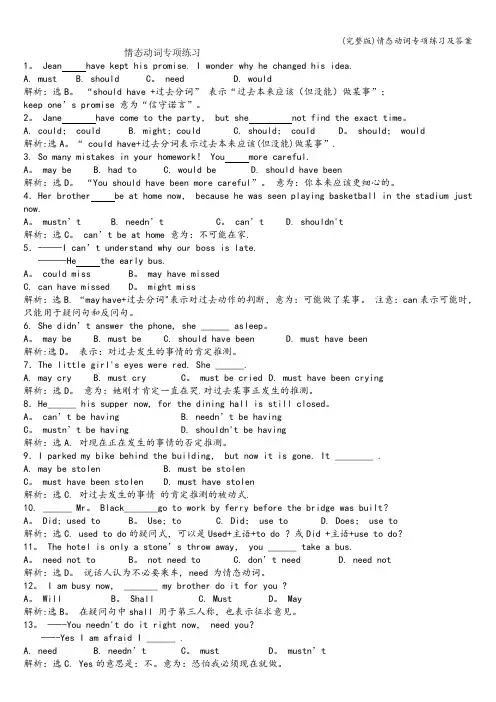
情态动词专项练习1。
Jean have kept his promise. I wonder why he changed his idea.A. mustB. should C。
need D. would解析:选B。
“should have +过去分词” 表示“过去本来应该(但没能)做某事”;keep one’s promise 意为“信守诺言”。
2。
Jane have come to the party, but she not find the exact time。
A. could; couldB. might; couldC. should; could D。
should; would解析:选A。
“ could have+过去分词表示过去本来应该(但没能)做某事”.3. So many mistakes in your homework! You more careful.A。
may be B. had to C. would be D. should have been解析:选D。
“You should have been more careful”。
意为:你本来应该更细心的。
4.Her brother be at home now, because he was seen playing basketball in the stadium just now.A。
mustn’t B. needn’t C。
can’t D. shouldn't解析:选C。
can’t be at home 意为:不可能在家.5.-——I can’t understand why ou r boss is late.———He the early bus.A。
could miss B。
may have missedC. can have missed D。
might miss解析:选B. “may have+过去分词"表示对过去动作的判断,意为:可能做了某事。
有关情态动词的专项练习题及答案
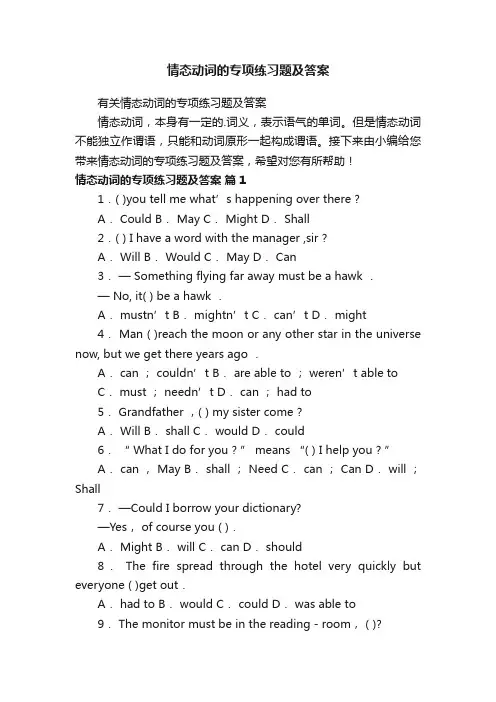
情态动词的专项练习题及答案有关情态动词的专项练习题及答案情态动词,本身有一定的.词义,表示语气的单词。
但是情态动词不能独立作谓语,只能和动词原形一起构成谓语。
接下来由小编给您带来情态动词的专项练习题及答案,希望对您有所帮助!情态动词的专项练习题及答案篇11.( )you tell me what’s happening over there ?A. Could B. May C. Might D. Shall2.( ) I have a word with the manager ,sir ?A. Will B. Would C. May D. Can3.— Something flying far away must be a hawk .— No, it( ) be a hawk .A.mustn’t B.mightn’t C.can’t D. might4. Man ( )reach the moon or any other star in the universe now, but we get there years ago .A. can ;couldn’t B. are able to ;weren’t able toC. must ;needn’t D. can ; had to5. Grandfather ,( ) my sister come ?A. Will B. shall C. would D. could6.“ What I do for you ? ” means “( ) I help you ? ”A. can , May B. shall ; Need C. can ; Can D. will ;Shall7.—Could I borrow your dictionary?—Yes, of course you ( ).A. Might B. will C. can D. should8.The fire spread through the hotel very quickly but everyone ( )get out.A. had to B. would C. could D. was able to9. The monitor must be in the reading-room, ( )?A.mustn’t B.doesn’t C.needn’t D.isn’t10.He hardly ( )say anything more,since you know all about it.A.don’t B.needn’t C. needs D. need11.You ( )to the meeting this afternoon if you have something important to do.A.needn’t to come B.don’t need comeC.don’t need coming D.needn’t come12.—May I pick a flower in the garden ? — ( ).A. No,you needn’t B. Not, pleaseC. No,you mustn’t D. No,you won’t13.—Helen, will you be at the party tonight ?—Yes, but I have so much homework to do that I really ( ).A.won’t B.can’t C.mustn’t D.shouldn’t14. If you listen to me, you ( ) have some candies,Deary .A. shall B. May C. will D. must15. Peter ____ come with us tonight,but he isn’t very sure yet.A. May B. Can C. will D. must16.—Dare you go home at night ?—_________.A. Yes, I do B. No,I daren’tC. No,I don’t D. Yes, I dare so.17. When you go abroad, do you _____ take your passport ?A. have to B. ought to C. be able to D. need18.—You must phone us every week.—Yes, I _____.A. must B. have to C. will D. should19.—Your language teacher looks a rather kind woman.—But in fact she is cold and hard on us. You _____ believeA. should B.wouldn’t C.mustn’t D. might not.20. A wise man __ sometimes make a mistake.A. can B. may C. might D. must21.—Shall I tell John about it ?—No, you ( ).I’ve told him already.A.needn’t B.wouldn’t C.mustn’t D.shouldn’t22. Tom ought not to ( )me your secret,but he meant no harm.A. have told B. tell C. be telling D. having told23.—When can I come for the photos ? I need them tomorrow afternoon.—They ( )be ready by 12:00.A. Can B. should C. Might D. need24.Sorry I’m late. I ( )have turned off the alarm clock and gone back to sleep again.A. Might B. should C. Can D. will25.—Are you coming to Jeff’s party ?—I’m not sure. I ( )go to the concert instead.A. must B. should C. Would D. might参考答案:ACCAB CBCCD DDDCB AABAC AAAAB情态动词的专项练习题及答案篇21. Peter ________come with us tonight, but he isn’t very sure yet.A. mustB. canC. mayD. will2. — Could you borrow your dictionary?— Yes, of course you ________.A. mightB. willC. canD. should3. A computer ________think for itself, it must be told what toA. can’tB. couldn’tC. may notD. might not4. I didn’t hear the phone, I ________asleep.A. must beB. must have beenC. should beD. should have been5. There was plenty of time, she ________.A. mustn’t have hurriedB. couldn’t have hurriedC. must not hurryD. needn’t have hurried6. The plant is dead. I ________it more water.A. will giveB. would have givenC. must giveD. should have given7. Very loud noises ________make people ill, hurt their ears, or even drive them mad.A. mustB. needC. canD. should8. He asked me for the dictionary many times; please tell him that he ________have it tomorrow.A. mustB. needC. mayD. dare9. — Why is she still standing there?— She ________be waiting for her boyfriend.A. canB. mustC. dareD. need10. Two eyes________ see more than one.A. canB. mustC. mightD. shall11. What ________he mean? ________you tell me?A. can; MayB. can; CanC. may; MayD. must; Should12. How ________he say that his teacher was unfair?A. mustB. mightC. couldD. need13. It ________be very cold in this part.A. canB. oughtC. shallD. dare14. I’d like to ask a question if I ________.A. mustB. willC. mayD. might15. Even in summer the temperature ________suddenly drop below freezing.A. mightB. oughtC. mustD. need16. He decided to join the army so that he ________defend the country.A. may helpB. might helpC. helpsD. helped17. You ________always be talking like that.A. mightn’tB. mayn’tC. can’tD. mustn’t18. The car ________have broke doown just when we were about to start off.A. mustB. couldC. mightD. should19. You ________see him while he is in hospital.A. have betterB. had betterC. would ratherD. had to20. There is a fine sunset; it ________to be a fine day tomorrow.A. oughtB. shouldC. has toD. has better21. You are his father, you ________take care of him.A. mightB. oughtC. ought toD. are able to22. That’s all. It ________be talked about any more.A. needn’tB. mightn’tC. darn’t toD. needn’t to23. The question ________discussing.A. needsB. needC. can beD. must be24. He ________even look out of the window.A. daren’tB. daresn’tC. dared not toD. dares not25. I’m so hungry that I ________find something to eat.A. have toB. wouldC. mayD. can26. All the students ________do their best for the modernization of our country.A. canB. shouldC. mayD. might27. You ________be careful with your homework.A. mustB. have toC. mayD. are used to28. It is getting darker. You ________not go home.A. had betterB. have betterC. would ratherD. would like29. I ________what happened to our school.A. would like knowB. would like to knowC. would like knowingD. would like that I know30. — Would you mind my changing the plan?— ________.A. Oh, no, pleaseB. Yes, I mind notC. No, I wouldD. Yes, I will31. — It ________ be Jack who is in the library.—I’m sure it ________be him, I saw him off at the railway station just two days ago.A. can’t; can’t eB. must; mustn’tC. must; can’tD. can’t; mustn’t32. I ________tell her the truth about his marriage.A. can’t helpB. can’t butC. may not helpD. mustn’t but33. Since she is angry, we ________.A. had better to leave her alongB. should leave her aloneC. would rather to leave her aloneD. must leave her alone34. Look! What you’ve done to me. You ________more careful.A. maybeB. had toC. should have beenD. would be35. ________read the letter for you?A. Would you like meB. Do you want meC. Will you mind meD. Shall I36. He promised he ________not make such silly mistakes.A. wouldB. shouldC. mightD. could37. ________it be true that his father will go abroad?A. CanB. MayC. NeedD. Should38. Those streams are so small that they ________be shown in the maps.A. mustn’tB. may notC. can’tD. may39. — May I use your bike?— ________.A. No, you may notB. No, you mustn’tC. No, you won’tD. Sorry, I’m afraid not40. — Must I write to her?— No, you ________.A. mustn’tB. shouldn’tC. can’tD. don’t have to41. — Need I start tonight?— Yes, you ________.A. doB. needC. mustD. may42. The old man ________sit for hours watching the ships.A. wouldB. shouldC. was used toD. would rather to43. If the telephone ________ring, please wake me up.A. wouldB. shouldC. willD. might44. I wish they ________stop making remarks about me.A. wouldB. willC. shouldD. shall45. You’re thirsty, aren’t you? ________he get some coffee?A. DoesB. ShallC. WouldD. Let46. Which of the following is wrong?A. That may be true.B. That might be true.C. That can be true.D. That could be true.47. — Would you lend me some money?— Yes, I ________.A. wouldB. willC. canD. may48. He ________ swimming when he was young.A. was used to goB. got used to goC. used to goingD. used to go49. You say you ________ not do it, but I say you ________do it.A. will; shallB. shall; shallC. shall; willD. will; will50. You ________out yesterday without a coat. No wonder youcaught cold.A. should have goneB. shouldn’t have goneC. could not have goneD. might have gone51. He ________the 8:30 train because he didn’t leave home until 9:00.A. can’t catchB. couldn’t catchC. may notD. can’t have caught52. You ________us this because we had more than enough.A. needn’t bringB. needn’t have broughtC. mustn’t bringD. co uldn’t have brought53. — He learnt the language in three months.— He ________very hard.A. must workB. might have workedC. must have workedD. might work54. — Who told you my telephone number?—I don’t remember. It ________Mary.—It can’t be Mary, she doesn’t know it.A. may have beenB. can have beenC. must beD. can be55. You ________him, why didn’t you?A. ought to thankB. ought have thankedC. ought to have thankedD. ought thank56. I ________have arrived a little earlier, but my car broke down.A. shouldB. couldC. canD. can’t57. — ________we go out for a walk?—Great. Let’s goA. ShallB. WillC. MayD. Should58. Though she was seriously ill, she ________ complete the work in time.A. wouldB. was able toC. was possible toD. might59. — Would you like to play chess with me?— Yes, ________.A. I’dB. I wouldC. I’d likeD. I’d like to60. Tom is late. He ________the wrong bus.A. must takeB. must have takenC. might takeD. could take1—10. CCABD DCCBA 11—20. BCACA BDDBA 21—30. CAAAA BAABA 31—40. CBBCD AACDD 41—50. CABAB CBDAB 51—60. DBCAC BABDB。
初一英语情态动词练习题40题含答案解析
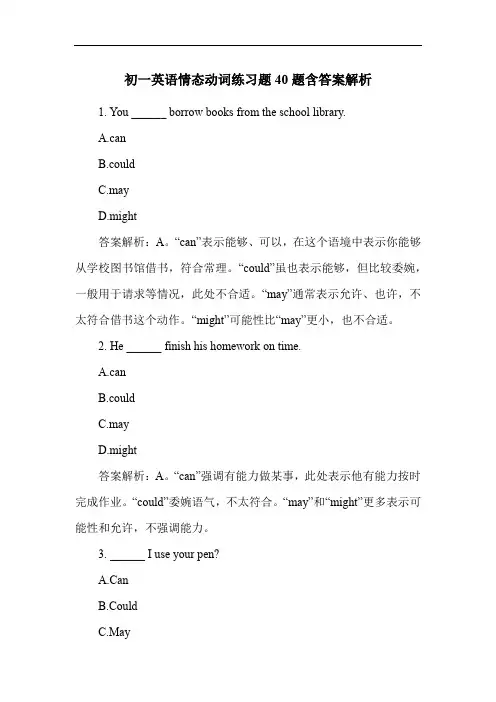
初一英语情态动词练习题40题含答案解析1. You ______ borrow books from the school library.A.canB.couldC.mayD.might答案解析:A。
“can”表示能够、可以,在这个语境中表示你能够从学校图书馆借书,符合常理。
“could”虽也表示能够,但比较委婉,一般用于请求等情况,此处不合适。
“may”通常表示允许、也许,不太符合借书这个动作。
“might”可能性比“may”更小,也不合适。
2. He ______ finish his homework on time.A.canB.couldC.mayD.might答案解析:A。
“can”强调有能力做某事,此处表示他有能力按时完成作业。
“could”委婉语气,不太符合。
“may”和“might”更多表示可能性和允许,不强调能力。
3. ______ I use your pen?A.CanB.CouldC.May答案解析:A 或C 都可以。
“Can I use your pen?”和“May I use your pen?”在请求别人允许时都可以用。
“could”和“might”语气更委婉,但不如“can”和“may”常用。
4. She ______ come to school early tomorrow.A.canB.couldC.mayD.might答案解析:C 或D。
“may”和“might”都表示可能性,此处表示她明天可能早点来学校。
“can”和“could”强调能力,不太符合语境。
5. We ______ listen to the teacher carefully in class.A.canB.couldC.mayD.might答案解析:A。
“can”表示能够、应该,在课堂上我们应该认真听老师讲课,符合语境。
“could”委婉语气,不太恰当。
“may”和“might”更多表示可能性和允许。
初中英语情态动词专项练习(附答案解析)
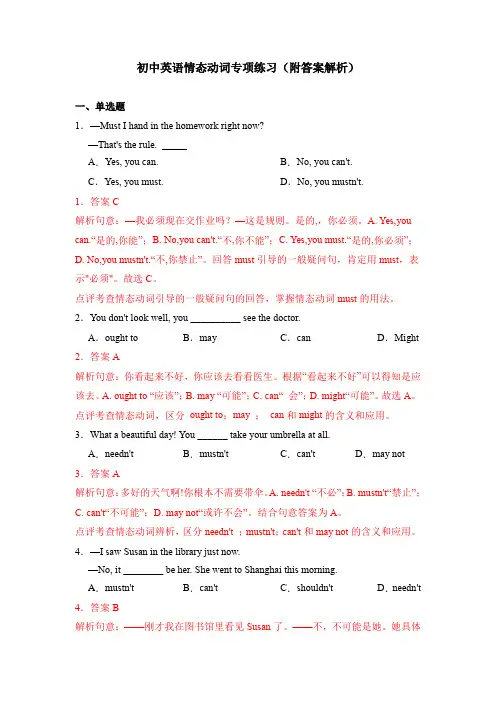
初中英语情态动词专项练习(附答案解析)一、单选题1.—Must I hand in the homework right now?—That's the rule.A.Yes, you can.B.No, you can't.C.Yes, you must.D.No, you mustn't.1.答案C解析句意:—我必须现在交作业吗?—这是规则。
是的,,你必须。
A. Yes,you can.“是的,你能”;B. No,you can't.“不,你不能”;C. Yes,you must.“是的,你必须”;D. No,you mustn't.“不,你禁止”。
回答must引导的一般疑问句,肯定用must,表示"必须"。
故选C。
点评考查情态动词引导的一般疑问句的回答,掌握情态动词must的用法。
2.You don't look well, you __________ see the doctor.A.ought to B.may C.can D.Might 2.答案A解析句意:你看起来不好,你应该去看看医生。
根据“看起来不好”可以得知是应该去。
A. ought to “应该”;B. may “可能”;C. can“ 会”;D. might“可能”。
故选A。
点评考查情态动词,区分ought to;may ;can和might的含义和应用。
3.What a beautiful day! You ______ take your umbrella at all.A.needn't B.mustn't C.can't D.may not 3.答案A解析句意:多好的天气啊!你根本不需要带伞。
A. needn't “不必”;B. mustn't“禁止”;C. can't“不可能”;D. may not“或许不会”。
高中英语情态动词形式练习题40题含答案解析
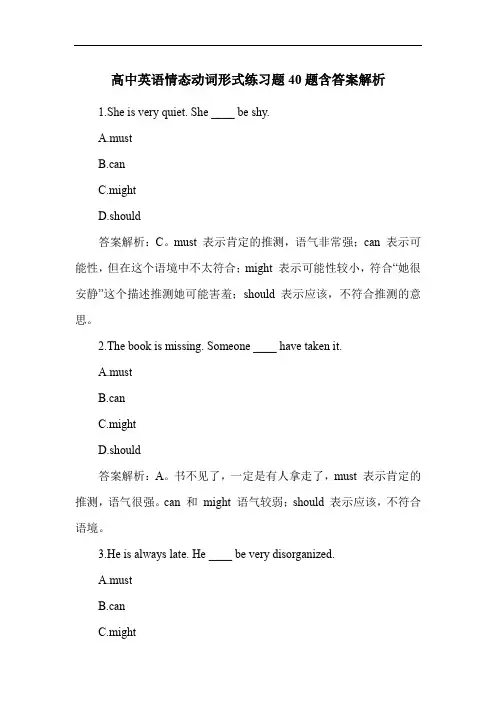
高中英语情态动词形式练习题40题含答案解析1.She is very quiet. She ____ be shy.A.mustB.canC.mightD.should答案解析:C。
must 表示肯定的推测,语气非常强;can 表示可能性,但在这个语境中不太符合;might 表示可能性较小,符合“她很安静”这个描述推测她可能害羞;should 表示应该,不符合推测的意思。
2.The book is missing. Someone ____ have taken it.A.mustB.canC.mightD.should答案解析:A。
书不见了,一定是有人拿走了,must 表示肯定的推测,语气很强。
can 和might 语气较弱;should 表示应该,不符合语境。
3.He is always late. He ____ be very disorganized.A.mustB.canC.might答案解析:A。
他总是迟到,肯定是非常没有条理,must 表示肯定的推测,语气强。
can 和might 可能性较小;should 表示应该,不合适。
4.The lights are on. Someone ____ be at home.A.mustB.canC.mightD.should答案解析:A。
灯亮着,肯定有人在家,must 表示肯定的推测,语气强。
can 和might 可能性较小;should 表示应该,不符合语境。
5.The test was very difficult. She ____ have passed it.A.mustB.canC.mightD.should答案解析:C。
考试很难,她可能通过了,might 表示可能性较小。
must 语气太强;can 表示可能性,但不太符合这个语境;should 表示应该,不符合推测的意思。
6.He looks very tired. He ____ have worked hard.A.mustB.canD.should答案解析:A。
情态动词练习题带答案
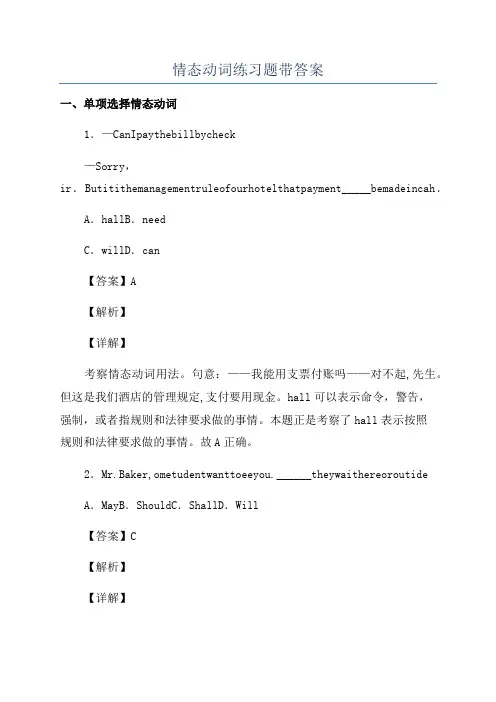
情态动词练习题带答案一、单项选择情态动词1.—CanIpaythebillbycheck—Sorry,ir.Butitithemanagementruleofourhotelthatpayment_____bemadeincah.A.hallB.needC.willD.can【答案】A【解析】【详解】考察情态动词用法。
句意:——我能用支票付账吗——对不起,先生。
但这是我们酒店的管理规定,支付要用现金。
hall可以表示命令,警告,强制,或者指规则和法律要求做的事情。
本题正是考察了hall表示按照规则和法律要求做的事情。
故A正确。
2.Mr.Baker,ometudentwanttoeeyou.______theywaithereoroutideA.MayB.ShouldC.ShallD.Will【答案】C【解析】【详解】考查Shall的用法。
句意:贝克先生,有些学生想见你。
他们是在这里等还是在外面等Shall用于第一、第三人称疑问句中,表示说话人征求对方的意见或向对方请示。
故选C。
【点睛】Shall的用法Shall作为助动词,一般用于第一人称Ⅰ和We,表示一个将来的动作,构成将来时态。
Shall后面接动词原形。
例如:(1)IhallthinkitoverandLetyouknowmyidea.我将考虑一下此事,然后告诉你我的想法。
1.Shall用于第一人称,表示征求对方的意愿。
如:Whathallwedothievening2.Shall用于第一、第三人称疑问句中,表示说话人征求对方的意见或向对方请示。
如:ShallwebeginourleonWhenhallhebeabletoleavethehopital3.Shall用于第二、第三人称,表示说话人给对方命令、警告、允诺或威胁。
如:Youhallfailifyoudon'tworkharder.(警告)HehallhavethebookwhenIfinihreading.(允诺)Hehallbepunihed.(威胁)3.---Hi,Johnon,anyideawhereSuaniA.canbeB.muthavebeenC.mighthavebeenD.houldbe【答案】D【解析】考查情态动词的用法。
高中英语情态动词专项练习200题(含答案)
高中情态动词专项练习200题Ⅰ.情态动词的特征:①本身有词义;②不能独立作谓语;③后接动词原形一起构成谓语;④不随人称和数的变化。
Ⅱ.情态动词各自的基本意义及用法:1.can 与could用法2.may与might用法3.must与have to用法4.need与dare用法5.should与ought to用法6.shall与will用法7.used to与would用法Ⅲ.情态动词表推测:1.大多数情态动词(除表‘能力、许可、意志’外),都可以表示推测,其程度有差异。
按可能性程度的高低排列为:must﹥will ﹥would ﹥ought to ﹥should完全肯定完全可能很可能﹥can ﹥could﹥may ﹥might可能有可能2.区分情态动词的否定含义:may not或许不、可能不might not可能不can’t 不可能mustn’t不许、禁止shouldn’t不应该needn’t 不必3.情态动词表推测具体运用:情态动词可以对现在、进行、过去推测。
4.表示反劝的特殊的表推测形式5.注意:Ⅳ.情态动词表推测的反意疑问句1.情态动词表推测的反意疑问句,简单来说,就是以情态动词后的时态为淮,如句子里有明确的时间状语,则以其为准。
2.以must 为例:e.g.: 1.You must be hungry now, aren’t you?2.He must be watching TV , isn’t he ?3.Tom must have lived her for a long time, hasn’t he ?4.She must have arrived yesterday, didn’t she?注:如选择题中(以She must have arrived yesterday, didn’t she?为例)既有didn’t she又有hasn’t she 则以didn’t she?为最佳答案。
【英语】 情态动词练习题(含答案)
【英语】情态动词练习题(含答案)一、初中英语情态动词1.—We've got everything ready for the picnic.—Do you mean I __________ bring anything with me?A. can'tB. mustn'tC. couldn'tD. needn't【答案】 D【解析】【分析】句意:—我们已经为野餐准备好了一切。
—你的意思是我不必带任何东西吗?A. can't 不能;B. mustn't 表示禁止,一定不要;C. couldn't不能,表示过去时态;D. needn't不必。
结合句意,故选D。
【点评】本题考查情态动词的用法。
2.—How amazing this robot is!—Wow, it has video cameras in its eyes, so it “see” and interact with people.A. mayB. canC. mustD. should【答案】 B【解析】【分析】句意:—这个机器人多么惊人啊!—哇,在它的眼睛里有摄像机,因此它能看见和人打交道。
A. may 可以,可能;表示许可,B. can 能;表示能力,C. must 必须;D. should应该;根据it has video cameras in its eyes,可知是有能力看见,故选B。
【点评】考查情态动词辨析。
熟记情态动词的含义和用法。
3.A hard-working man ______ become a great scientist, but a great scientist _______ be a hard-working man.A. can't; canB. may not; mustC. can't; mustD. may not; can【答案】 B【解析】【分析】句意:一个勤奋的人可能不会成为一位伟大的科学家,但是一位伟大的科学家一定是一个勤奋的人。
高中英语情态动词形式练习题40题含答案解析
高中英语情态动词形式练习题40题含答案解析1.You come to the party tonight if you finish your homework.A.canB.couldC.mayD.might答案解析:A。
“can”表示有能力或有机会做某事,在这里表示如果你完成作业就有机会来参加今晚的派对。
“could”和“might”语气较委婉,“may”通常表示可能性。
在这个语境中,强调有能力和机会,用“can”最合适。
2.She pass the exam if she studies hard.A.canB.couldC.mayD.might答案解析:A。
同样,这里强调如果她努力学习就有能力通过考试,“can”表示能力。
“could”“might”语气委婉,“may”表示可能性,这里突出能力,所以选“can”。
3. you help me with this math problem?A.CanB.CouldC.May答案解析:B。
这里用“could”表示委婉地请求,“can”语气较直接,“may”和“might”在这个语境中不太符合请求的语气。
4.I ask you a question?A.CanB.CouldC.MayD.Might答案解析:C。
“may”用于请求许可比较正式,“can”也可以用于请求但相对不那么正式,“could”和“might”语气委婉但在这里不太符合直接请求的语境。
5. he come to school late today?A.CanB.CouldC.MayD.Might答案解析:D。
“might”在这里表示对可能性的较小推测,他今天有可能会迟到吗?“can”和“could”通常不用于这种较小可能性的推测,“may”也不太符合这个语境。
6. you lend me your pen?A.CanB.CouldD.Might答案解析:B。
“could”表示委婉地请求借笔,“can”语气较直接,“may”和“might”不太符合请求借东西的语境。
完整版)情态动词练习题及答案
完整版)情态动词练习题及答案1.I XXX't dare to ask you。
because I thought I must be wrong.2.There used to be some flowers in the garden.3."Could I take it out?" "I'm sorry。
you couldn't."4.You were stupid to climb the tree。
You might have hurt yourself.5.You should have posted those XXX't you?6.All the lights are on。
the Smiths must be getting up.7.He may lead a horse to the water but he can't make it drink.8."Need we do this job now?" "You must."9.Would you like to have lunch with us today?1.我不敢问你,因为我认为我一定是错的。
2.花园里曾经有一些花。
3.“我能把它拿出来吗?”“对不起,你不能。
”4.你爬树很愚蠢。
你本来可能会受伤的。
5.你本该寄那些信。
为什么你没有寄?6.所有的灯都亮着,XXX一家肯定在起床了。
7.他可能引马到水边,但他不能强迫它喝水。
8.“我们现在需要做这个工作吗?”“你必须这么做。
”9.你今天愿意和我们一起吃午餐吗?10.He said that you could watch TV all evening if you wished.11.–Is John coming by train。
--He should。
- 1、下载文档前请自行甄别文档内容的完整性,平台不提供额外的编辑、内容补充、找答案等附加服务。
- 2、"仅部分预览"的文档,不可在线预览部分如存在完整性等问题,可反馈申请退款(可完整预览的文档不适用该条件!)。
- 3、如文档侵犯您的权益,请联系客服反馈,我们会尽快为您处理(人工客服工作时间:9:00-18:30)。
精选练习情态动词1.You________read that article if you don’t want to.A.haven’t B.can’t C. mustn’t D.needn’t 2.I_______get this done immediately or it will be too late.A. must B.can C.may D.might3.The house is dark;the Browns_________ to bed.A.may go B.should goC.should have gone D. must have gone 4.“That car must have cost a 1ot of money.”“Oh,no,_____.”A.it mustn’t B.it hasn’tC.it doesn’t D.it didn’t5. I _______asleep in the corner,for 1 remember nothing of what happened during the night.A.might fall B. must fallC.must have fallen D. can have fallen 6.I’m feeling sick.I_________so much chocolate.A.needn’t have eaten B. couldn’t have eatenC.mustn’t have eaten D.shouldn’t have eaten7. My wallet is nowhere to be found.I________when 1 was on the bus.A.must have dropped it B.must drop itC. should have dropped it D.ought to have dropped it8.Mr.Green________my letter,otherwise he would have replied before now.A.must have received B.must have failed to receiveC.must receive D. must fail to receive9. You could have done much better yesterday.Why_________?A.didn’t you B.couldn’t youC. hadn’t you D.shouldn’t you10.They have done things they ought_______A.not to do B. not to be doneC.not to have done D.not having done11. You had better__________a doctor as soon as possible.A.seen B.saw C.see D.seeing 12.I believe he__________an accident.otherwise he would have arrived on time.A.would have had B. could have hadC.should have had D.must have had 13.Something must have happened on their way here.Or they_______by now.A.should have arrived B.should arriveC.would have arrived D.would arrive14. “Are you coming ‘to Jeff’s party?”“I’m not sure. I _________ go to the concert instead.”A.must B. would C.should D.might 15.“Will you stay for lunch?”“Sorry.___________.My brother is coming to see me.”A.I mustn’t B. I can’t C.I needn’t D.I won’t 16.“I heard they went skiing in the mountains last winter.”“It __________true because there was little snow there.”A.may not be B.won’t be C.couldn’t be D.mustn’t be 17.“Shall we go skating or stay at home?”“Which __________do yourself?”A.do you rather B. would you ratherC.will you rather D.should you rather 18.I was really anxious about you.You_______home without a word.A.mustn’t leave B.shouldn’t have leftC couldn’t have left D.needn’t leave19.Someone is coming here.Who___________it be?A.will B. shall C.must D.can 20.——May I stop here?——No,you_________.A.mustn’t B. might not C.needn’t D.won’t1—5.DADDC 6—10.DABAC 11—15.CDADB 16—20.CBBDA 练习解析1.本句意为:如果你不想,你……读那篇文章。
A表示“没有读”,B表示“不能读”,C表示“一定不能读”,显然都不符合句意。
选D,意为“不必读”。
2.本句意为:我……把这件事立即做完,否则就太晚了。
B表示“能”,C表示“可以”,D表示“也许”,意思都不对。
选A,表示“我必须把这件事立即做完,否则就太晚了”。
3.本句意为:房间是黑的,布朗一家(定冠词the+姓氏的复数,表示一家人)肯定已经睡觉了。
go to bed(上床睡觉)这个动作应该在说话前就发生了,是对过去发生的动作表示推测,用must+have done,应该选D。
4.must have done表示对过去的事情的肯定推测。
本句意为:“那辆车肯定花了不少钱。
”“不,……。
”按照意思推理应该是“没有花很多钱”,应该用过去时态。
it didn’t cost a lot of money,省略相同的部分应该为it didn’t。
选D。
5.从for引导的原因状语从句判断,“我一点都记不得那天晚上发生的事了”前面的主句应该是“我肯定是在角落里睡着了”。
对过去发生动作的肯定推测,用must have done,选C。
6.本句意为:“我感到恶心”。
“我不该吃这么多巧克力”。
表示不该做某事但却做了,应该用shouldn’t have done。
选D。
7.本句意为:我的钱包到处都找不到。
肯定是在车上的时候,我把它弄掉了。
对过去情况的肯定推测,用must have done,所以选A。
8.本句意为:格林先生……我的信,否则他应该已经回信了。
据此可以判断,格林先生没有收到我的信,排除A,C。
这里是对过去有没有收到信进行推测,应该用must have done所以选B。
fail to do表示“做某事不成功”。
9.could have done表示过去能够,但却没有做到。
本句意为:你昨天本来能做得更好。
为什么没有做到呢?如果用完整的句子是:Why didn’t you do much better yesterday?省略形式为Why didn’t you?选A。
10.本句意为:他们做了他们不应该做的事。
表示不该做而做了,应该用shouldn’t have done或ought not to have done,选C。
11.had better do表示“最好做某事”,选C。
12.本句意为:我觉着他肯定是出事了,否则他会准时到的。
对过去发生的情况进行推测,用must have done。
选D。
13.本句意为:他们在路上肯定出什么事了。
否则他们现在应该到了。
表示应该发生而没有发生,用should have done。
选A。
14.本句意为:“你来参加杰夫的晚会吗?”“我不能确定。
我……去听音乐会。
”既然是I‘m not sure.(我不能确定)那么后面应该是“我也许会去干什么”。
“也许”应该用might。
这里,might不是may的过去式,只是表示更不太可能发生的事。
选D。
15.根据语境“我的哥哥要来看我”说明“不是我不愿意,而是我不能那样做”。
再者,当will用于第二人称提问的问句中,表达的是一种请求,其肯定回答可用sure/certainly/I’d be glad to等;否定回答常是I'm sorry I can’t.I’d like to,but…等。
选B。
16.根据句意,这是对“过去不可能去滑雪”的推测,应该用couldn’t,表示否定推测“不可能”。
选C。
17.would rather do表示‘‘宁愿”,疑问句中would可以提到主语前面,选B。
18.本句意为:我真的为你感到着急。
你不应该不说一声就走了。
表示过去不应该做而做了,应该用shouldn’t have done,选B。
19.本句意为:有人朝这边走来了。
可能是谁呢?表示推测,又是在疑问句中,用can,选D。
注意:must表推测用在肯定句中。
20.may开头的疑问句,否定回答常用mustn’t,表示“一定不行”,语气很强,选A。
